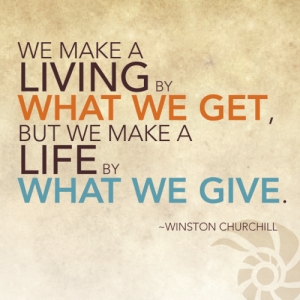 Pope Francis’s latest tough-love sting was against people who are too wrapped up in consumerism, at the cost of our spiritual individual and collective lives.
Pope Francis’s latest tough-love sting was against people who are too wrapped up in consumerism, at the cost of our spiritual individual and collective lives.
We live in a world that is always more artificial, in a culture of ‘making,’ of ‘profit,’ where without realizing it, we exclude God from our horizon…Often today, giving freely is not part of daily life, where everything can be bought and sold, where everything is calculated and measured — Pope Francis, March 5, 2014
He tells us that the downside of not just having stuff, but loving our stuff, costs more than cash or credit because it’s taxed with our peace of mind. Once you have stuff, you invite fear–fear of losing it, fear of having it taken. We have to be on alert and vigilant. Maybe even anxious. Perhaps that’s why so many people think back nostalgically to times when they had nothing, but were happy. I remember when my husband and I were just married, we had very little. We were leaving for the day shortly after moving into our first place, and I asked him, “Shouldn’t we lock the door?” To which he responded, “Nah, if a robber came in, he’d probably feel sorry for us and leave us a buck.”
I got no lock on the door
That’s no way to be
They can steal the rug from the floor
That’s OK with me
Cause the things that I prize
Like the stars in the skies
All are free!
–I Got Plenty o’ Nuttin, George Gershwin, Porgy and Bess
So excessive attachment to our stuff causes us to be fearful. Pope Francis also talks about the sadness obsession with possession brings, because being preoccupied with our stuff cuts us off from others. We become territorial. We develop a “what’s mine is mine” mentality, and to protect what’s mine, like every toddler, we become little watchdogs to prevent others from getting too close. It’s a zero-sum game. If they get, I lose.
Well, actually, some say it’s not a zero-sum game. When I share or when I give, I don’t lose. I gain. Who says so? Well, the Bible for one, which instructs us to give our first one-tenth to God. And what does that do? It makes us prosper. It makes US prosperous. And this is not just a woo-woo idea by a New Age author or a biblical scholar. George Clason says in the classic prosperity book, The Richest Man in Babylon. Modern-day financial guru David Bach teaches the same in his blog:
This notion—that the more we give back to others, the more comes back to us—is not simply a religious doctrine; it is virtually a law of nature. If you are looking to attract more wealth and happiness into your life, the fastest way I know how is to give more.
He said it–it is a law of nature. We are hard-wired to share. It makes us feel good, and somehow a flow is generated by giving that acts like a boomerang–it all comes back to us with more. Obsession with stuff=sad; Sharing=glad! Plus, a side benefit of letting go of obsession with possession is that by buying less, you are minimizing the impact of all this stuff on our air, land, and water.
In short, sharing, giving, and anti-consumerism may sound like a tree-hugging idea, but it is really a me-hugging idea.
How do we know if we are obsessed with our stuff? Good question. Richard Foster, in his book Freedom of Simplicity, offers a simple way to find out. He says to start by just giving something away. Not that ugly shirt you got for Christmas. Give away your favorite shirt. Just for the fun of it. Examine your feelings when you do. Frankly, as for me, way too often when I think about releasing many of my own possessions I feel exactly like that young man in the New Testament that turned away sad after Jesus proposed to him that his possessions may be coming between him and his spiritual yearnings. Like him, I’ve already flunked the entrance exam.
We have, for the past several decades, established the paradigm that progress is measured in GDP. Outward upward mobility is more important than inward upward mobility. But we are seeing that there is a hangover that comes with the addiction to stuff. We are seeing many symptoms of a sick society, and it’s nothing a little more sharing, a little less hoarding couldn’t cure.
I remember a book I read in grammar school about a dad who gave his son and daughter each their own garden to tend. Each child started with the same size plot of land and the same number of flower seeds. Both gardens grew and flourished. One day the boy decided to cut some flowers for his teacher; his sister didn’t want to deprive herself of the beautiful blooms she had cultivated. One day the boy decided to cut some flowers for the elderly neighbor; again, the sister didn’t want to share the flowers–she was enjoying them too much. The boy continued to cut his flowers and give them away; the girl continued to keep them for herself.
Anyone who knows anything about gardening knows exactly what happened. The boys garden soon was prolific in its blooms–because every flower cut yielded at least two more. The girl’s garden unfortunately just went to seed and languished. The moral of the story if obvious. Who had the prettiest garden now?
Some people, proponents of the gift economy like Charles Eisenstein, are suggesting that maybe we see that this story is not just a parable about a family garden–but perhaps the concepts are true on a global scale. Perhaps we dismantle some of the economic dogmas that are proving to be counter-productive, such as the idea that hoarding money–when our brothers are in need and when our resources are being decimated–might bite us in the butt very soon. Maybe we have to redefine progress on an individual level, and then scale that up to local and global models of economic development.
We all want progress, but if you’re on the wrong road, progress means doing an about-turn and walking back to the right road; in that case, the man who turns back soonest is the most progressive. –C.S. Lewis












Recent Comments